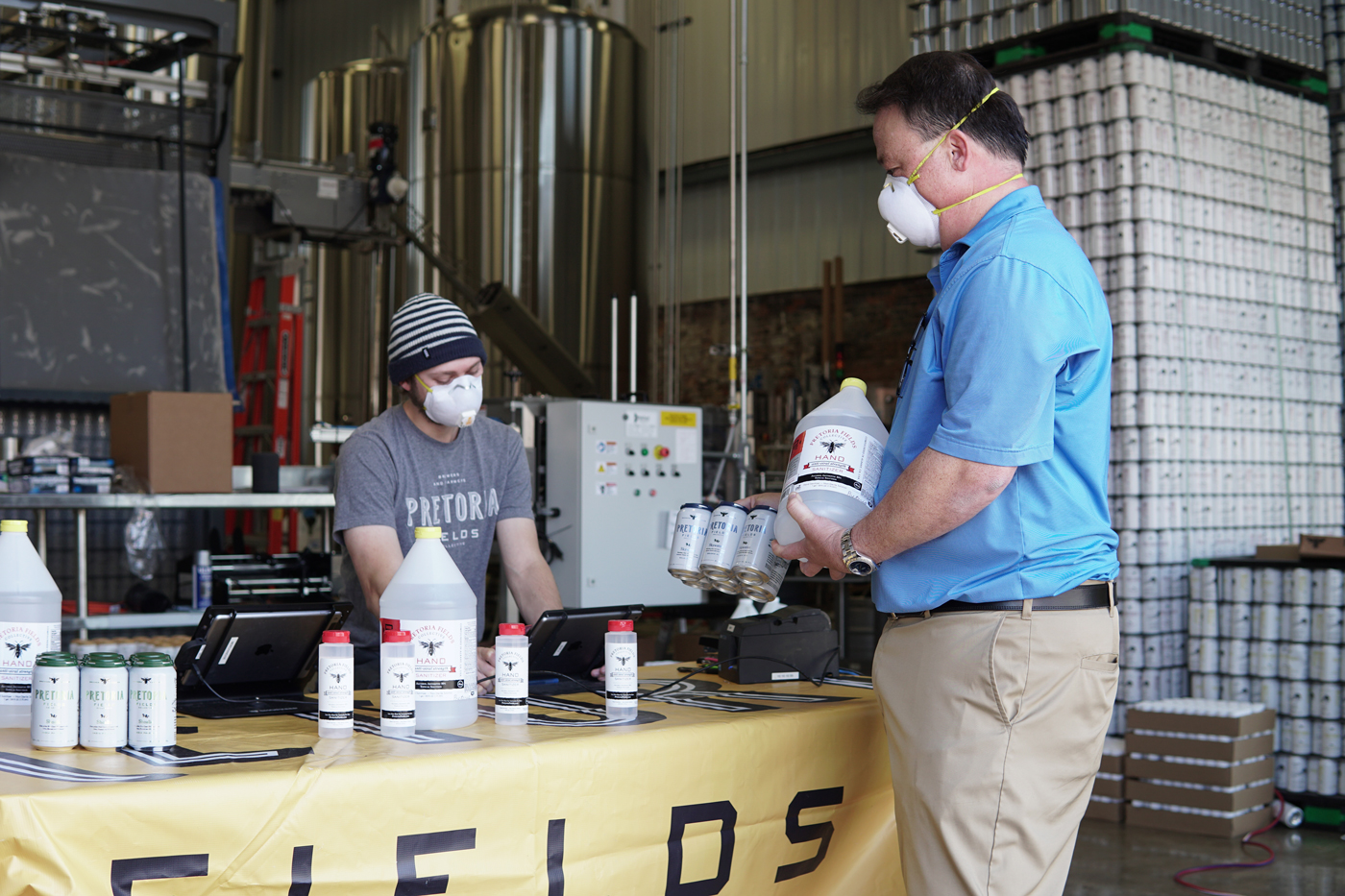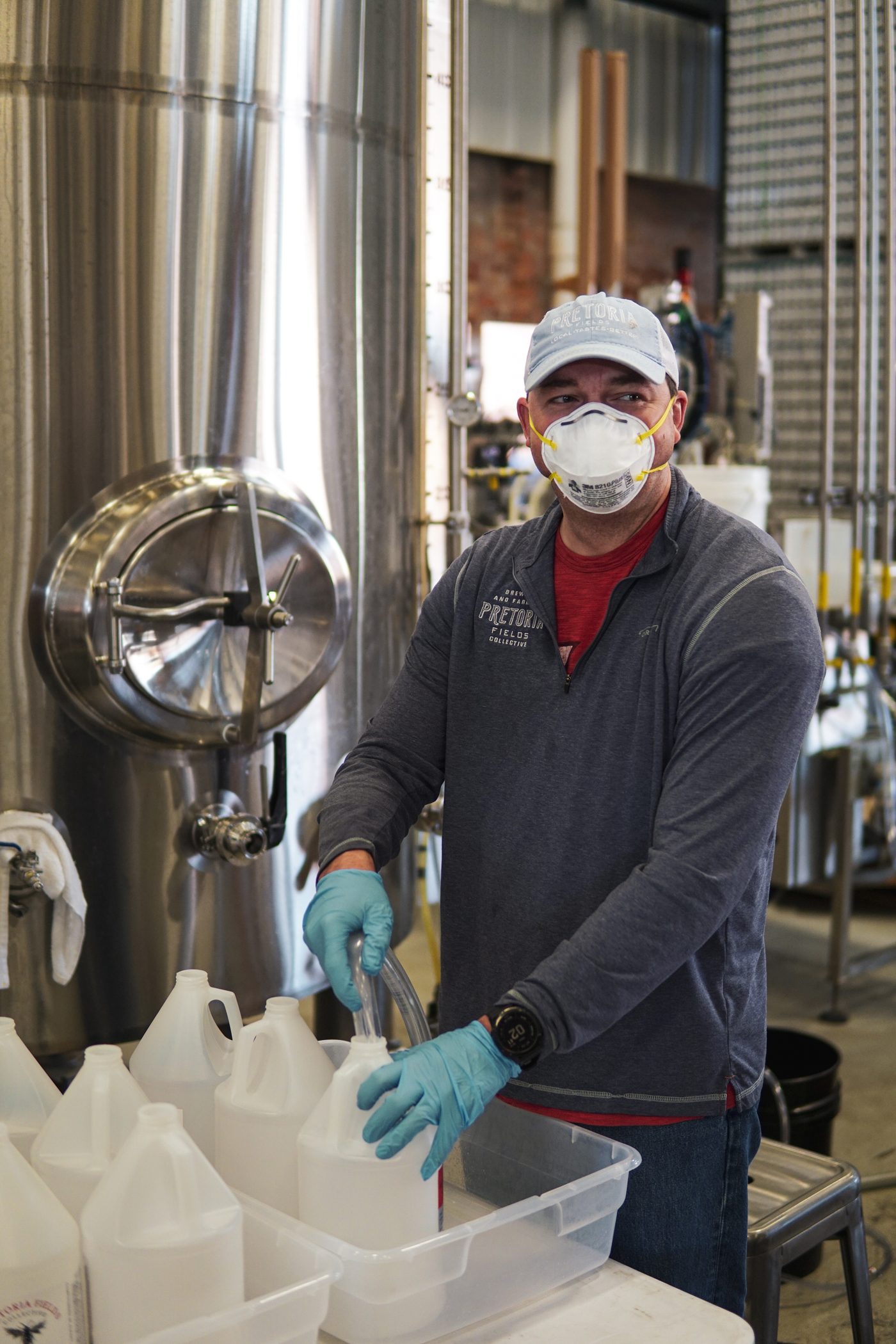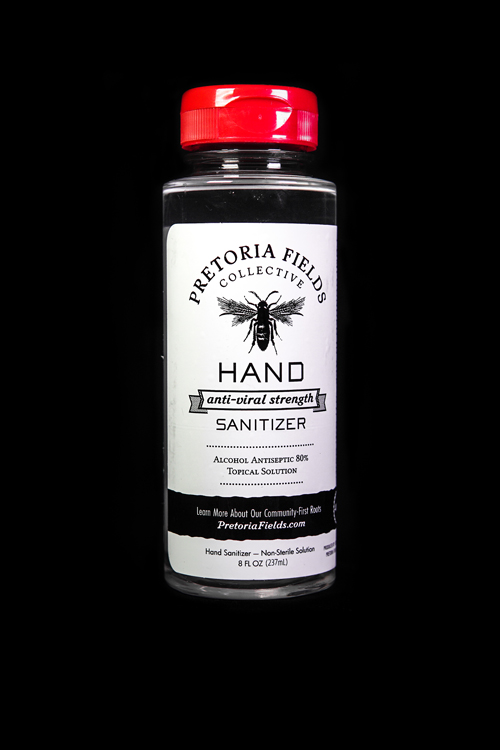 How South Georgia’s Pretoria Fields Collective is making a difference in our time of need
How South Georgia’s Pretoria Fields Collective is making a difference in our time of need
Tripp Morgan, M.D., grew up on the farmlands of Camilla, Georgia, a small town located deep in the southwest corner of the state. As a fifth-generation Georgian, his appreciation for the rich landscape of the South was instilled at a young age. Morgan studied medicine, graduating from the University of Georgia College of Pharmacy in 1997 and Mercer University School of Medicine in 2001. During that time, he developed an interest in craft beer, even enjoying his own home brews while in school.
 Fast-forward 15 years, when Morgan sat on the porch of his family’s farmhouse in Albany, Georgia, with his father, Harris. As they overlooked their 200-plus acres of organic wheat, Morgan began to dream of brewing his own craft beer, while also creating a space for his community to meet and enjoy authentic Southern beers and local camaraderie.
Fast-forward 15 years, when Morgan sat on the porch of his family’s farmhouse in Albany, Georgia, with his father, Harris. As they overlooked their 200-plus acres of organic wheat, Morgan began to dream of brewing his own craft beer, while also creating a space for his community to meet and enjoy authentic Southern beers and local camaraderie.
Pretoria Fields Collective opened its tasting room doors in downtown Albany in 2017. Morgan brought on Tom Vess as CEO in 2019 to run the brewery and expand their consumer reach. Vess brought more than 30 years of experience in the malt beverage industry to the Collective.
As COVID-19 made its way into and across the United States in early-2020, Vess and his team saw an opportunity to help the community of Southwest Georgia and beyond. The process would not be an easy one, and it would come with a significant investment of time and resources as well as a mental shift regarding the brewery’s focus and purpose.
We sat down with Vess in early-April to learn how he and his team were able to redirect their business model and implement round-the-clock production to help keep first responders, healthcare workers, law enforcement and the public safer.
What is your branding strategy?
It is less of a strategy, and more of a story. We are a collection of farmers, brewers and community members who are all working together to bring jobs and enjoyment into everything we produce. Our tradition as farmers is to focus on organic, sustainable farming and natural resource management. We support local agriculture across the region and partner with many farms to source most of the ingredients in our beer from local farmers. Our company is a proud partner of Georgia Grown, a division of the Georgia Department of Agriculture.
What is the secret to creating a branding story that consumers will support?
It has to be honest. Consumers are smart, and they know fact from fiction. They want to be part of an economic cycle that hears and understands them. That’s one of the reasons our company works so well.
Who is your demographic?
Our core drinkers are young professionals and predominately male. We have recently launched Southern Harvest Light Lager and will soon launch four different seltzer flavors to increase our market penetration. We believe this will attract more female drinkers to our portfolio.
How does your taproom space integrate into your branding/marketing strategies?
Our taproom space was created as a place for people to enjoy our beers and the company of friends and neighbors. It provides an atmosphere of comfort and home. We have an outside stage area for local musicians, and we welcome dogs. There are indoor and outdoor games for our patrons to enjoy while they are here. The taproom space is not just a space to drink beer, it’s a space created to also connect with those around you. It really goes back to our original purpose — to thrive in the community and for our community members to do the same.
Do music and other arts play a role in your overall brand strategies?
Absolutely. We actually have a local radio station broadcasting from our taproom. The Queen Bee radio station showcases local artists and is working to partner with larger artists. Music brings people together, and having a radio station in the taproom is an awesome experience for our patrons and staff. We are a Collective.
What is your distribution model outside of patrons in the brewery?
We have a staff of sales representatives who work with our distributor partner to increase our distribution and volume. They focus primarily on the on-premise channel and large format stores. United Distributors represents our portfolio in Georgia and Alabama. Our intent was to expand into other states this year. However, given what has transpired over the last months, it may by 2021.
Our tradition as farmers is to focus on organic, sustainable farming and natural resource management. Our company is a proud partner of Georgia Grown, a division of the Georgia Department of Agriculture.
When and how did the idea of making hand sanitizer evolve?
We were fortunate to have creative thinkers on our team, and our founder, Dr. Tripp Morgan, suggested making hand sanitizer to help our community and offset the loss of beer sales. Our Collective has a division, Pretoria Research, Development, and Manufacturing, that is managed by some compounding pharmacists and partners, including Will Coley, who helped create the formula based on FDA guidelines.
We then made a decision to get into the fight. We used our fermenters to mix distilled ethanol with glycerin, hydrogen peroxide and distilled water to make a topical hand sanitizing solution. Our team tested the process in a small batch and then expanded it into bulk processing.
How quickly were you able to put your plan into action?
After we received approval from the Department of Revenue, our team came together and repurposed the brewery, sourcing the chemicals and materials needed to move this project forward. Our brewery transformed into making hand sanitizer in fewer than 72 hours. The hurdle we face daily is that we are having to label and package the hand sanitizer manually. However, we are improving our production abilities each day.
How significant was your investment and how long before a ROI?
The upfront cost was more than our brewery could manage on its own. We started doing business with new vendors that did not know anything about us, and they required payment up front or a deposit. This required many of us to use our own personal credit cards to source ingredients and materials to expedite what was needed to produce the hand sanitizer.
We will have to replace all of our hoses, gaskets and other hardware when this is over. Until we get all of our expenses calculated, it is difficult to determine a ROI. We are only a little over three weeks into this project and believe we made the right decision to save some employees from being furloughed and help our community.
 Can you estimate how many people you have helped with your sanitizer since late-March?
Can you estimate how many people you have helped with your sanitizer since late-March?
I am confident it is tens of thousands. Our first focus was healthcare professionals, first responders and the police officers. We are now working with hospitals and the Veterans Affairs Medical Centers across the Southeast. Organizations are driving from as far away as Maryland to get our hand sanitizer. We never dreamed the demand would be this high and are truly blessed that we have the knowledge, equipment and staff to serve.
Have you been able to retain employees because of your decision to redirect your equipment for making sanitizer?
We have been able to save most of their jobs. However, we did have to furlough some Albany employees. The closing of our taproom and order by Gov. Brian Kemp to shelter at home left us no choice, unfortunately. It was a difficult decision, and we hope to have all of them back with us soon. The purchasing of the product and materials likely helped other industries retain employees.
What kind of conversations are you having with your customers?
We are stressing the importance of social distancing to the general public when at the brewery to purchase hand sanitizer or beer. Most everyone has anxiety and is coming to grips with what we are facing globally. The conversations are focused on the ingredients of our product and story of Pretoria Fields Collective. We have been encouraging to all and stressing that we are all in this fight together. Everyone has been grateful and supportive of what we are now doing and is thankful we have hand sanitizer for purchase. Our entire staff is proud of what we are doing for the community, and I am proud of each of them for stepping up in a time of need.
Comment on the role your brand should play in being a leader in a distressed market.
Dr. Morgan treats his employees like family, and he loves his community. He and Tony Carder, a shareholder, streamlined this project with our team, and it allowed us to save jobs and provide a necessary product to all in a time of need outside of our local neighborhood. A company or brand that has the ability and knowledge to convert their current operation to help others should always step forward without hesitation. It is important to demonstrate that we are not just a neighborhood brewery, but that we are all in this fight together and this is the time to step up and help those that need it.
Give us a snapshot of today’s craft brew market.
The craft breweries have closed their taprooms, lost all of the on-premise sales, and are struggling to keep beer on the shelves. The outlook is worrisome for all of us. It is with a heavy heart that I believe there will be several small breweries unable to weather this pandemic and reopen their doors.
What’s likely to happen next for your brewery?
After we, as a country, have turned the corner on COVID-19 and can get back to some sort of normalcy, we will continue with our normal business plan. We would like to expand our production brewery and taproom into Pretoria Fields Farmhouse Brew Pubs. Our first location will be in Locust Grove, Georgia. This will allow patrons to get the Pretoria Fields Collective experience wherever they’re drinking our beer. Increasing our distribution into other states is high on the list.
We are in the process of opening a hemp processing plant and producing CBD products. Our first CBD store opened in McDonough, Georgia, in March. Our hand sanitizer is being sold there as well. These projects and our sales team will provide the platform for continued growth in the years to come.
